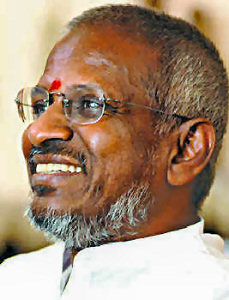(A guest article from Unnikrishnan AM, who also took some pics at the gig that can be seen here)
It was an event to look forward to. After all, veteran composer “Isaignaani” Ilayaraja had not done that many shows overall, and this was his first one in the US. The uniqueness of the event was the USP for the organizers as well. Sharing such high expectations with the approximately 11,000 people in attendance, this fan trooped into the Prudiential Center in Newark, New Jersey. The legion of fans had come from far and wide, some even crossing the wide swaths of the United States and abroad – California, Canada, Utah – these were some of the far-flung places from where the faithful had converged.
As the multitude of people started streaming in, this writer wondered, which of Raaja’s vast repertoire of tunes would be showcased? Would it be his numerous melodies, those which probably united a thousand couples, those soft lullabies which put many a child to soft sleep, the soulful songs that caused many a heart to cry, or would it be those soil-of-the-earth folk numbers, or perhaps even a glimpse of fast-tempoed hits? Looking around, one could see many in their 30s and older, perhaps a sign of who grew up listening to Raaja.
One would have hoped for things to start out on time, but that was not to be. Was more than a little disappointing, considering the maestro’s legendary discipline. But the expectation of watching and listening to some mellifluous music kept the crowd waiting. When it became apparent that the show was about to begin, the crowd became still, the silence before the storm. In keeping with the nature of the man, the show began on a devotional front, with the chorus singing guru pranaamam. Then Raaja entered the stage with a rendition of “Janani”, one of his own compositions. The devotional vein continued with singer Karthik paying homage singing “Om Shivoham” from the “Naan Kadavul” movie. And in keeping with the mixed nature of the crowd, primarily people speaking either Tamil or Telugu, the Thyagaraja keerthana “Jagadaananda Kaaraka” was sung by SPB.
It was only after getting the audience in a spiritual mood that Ilayaraja even step up to the mic to talk about the show. He was very brief, promising the audience a “sangeetha thirunal”. This was the cue for the composer’s daughter, Bhavatharini, to croon “Idhu Sangeetha Thirunaalo”, from the popular movie “Kaathalukku Mariyaathai”. The tempo then switched in a melodic vein, which was pretty much the theme for most of the evening. Crowd pleasers and evergreen favorites like “Shenbagamae” were performed, much to the audience’ delight. They also let know their appreciation when the veterans like SPB and Chitra came on to perform. Chitra’s gentle smile was lapped up by the crowd, as well as her rendition of one of her earliest hits, “Ninnukori Varanam”. With a strong emphasis on melody, Raaja tried to cater to all sections of the audience, with SPB & Mano taking the lead on Telugu numbers, and singers Karthik and Yuvan Shankar Raja, a composer with a strong youth following himself, appealing to the younger crowd.
A note must be made here of the Maestro’s legendary perfectionism and penchant for discipline. When Karthik was singing “Yennodu va va” from the recent “Neethane En Ponvasantham”, he whispered in Raaja’s ear for permission, and only then asked the crowd to join him in clapping to the song. All of the songs played were close in orchestration to the originals, and when the instrumentalists missed a note or two, Raaja did not hesitate to stop the song, and start them over. His frustration at these became apparent when SPB asked him the question about why he did not do too many live shows. The answer was that it took a lot of preparation (this one was apparently two months’ work), and even after that, there were mistakes committed. That affected him and his quest to hold a high standard.
The discipline part came through when a request was made at the beginning of the show to the audience to not engage in whistling. Also, because there was a significant section of the crowd that spoke Telugu, but because a majority of the songs were in Tamil, some members of the audience started clamoring loudly for more Telugu numbers. After a point, the composer himself rebuked them, reminding them of the universality of music. In contrast to other Indian shows, Raaja primarily kept to himself and let his music speak for him. Even his interactions with the audience were limited. The ubiquitous white veshti and kurta was by itself, a reminder to others about the flair of the man for simplicity and discipline.
Despite Raaja’s reservedness, SPB & Mano tried to draw him out, and get him to reveal some nuggets about the way he composed his music. He mentioned that he had scored for more than 920 movies, but the basic tune for the majority of his songs was done in just half an hour! It took longer for him to write out the notations to hand out to the musicians. A mention was also made about how he usually provided 3 or 4 tunes for a particular scene to the director. His sense of humor was also revealed when he pulled Mano’s leg for introducing the singers in a Tvesque fashion, instead of normally calling them out!
As the evening moved along, the melodies kept coming, and the audience kept demanding more and more. Raaja complied with more than 40 songs and almost 5 hours of non-stop music. “Naan thedum sevanthi poo”, “Azhagu malar aada”, “Thendral vandu theembothu”, “Oliyilae Kalandadu”, “O priya priya”, “Saayyndu saayyndu”, “Sundari kannaal oru”, “Maasai maasa”, were amongst the many popular and time-tested melodies that were rendered. The maestro finally signed off with the boisterous “Nila adu vaanathu maelae” and the soulful “Thenpaandi cheemayilae”.
As your author walked out into the night, he felt satisfied overall. The only minor nitpicks that there could have been more up-tempo and folk numbers, like “Raakkamma kaiya thattu”. Also, the absence of some of the advertised singers like Hariharan and Sadhana Sargam was felt. There were no songs in Hindi or Malayalam, either. But all of this was just small stuff, in comparison to the musical spectacle that was just experienced.



